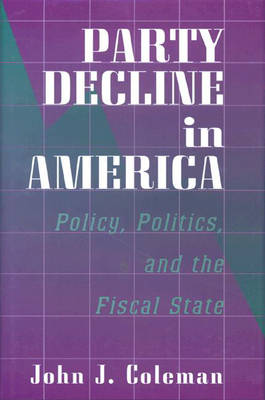Princeton Studies in American Politics: Historical, International, and Comparative Perspectives
1 total work
As the influence of political parties diminished in postwar America, scholars argued about whether this decline was caused by changes in voter behavior, new styles of campaigning, or trust-shattering events such as Vietnam and Watergate. To some, parties were the relics of a technologically less sophisticated era. Today, however, many believe that these institutions have an inevitable tendency to adapt and survive. In John Coleman's view neither party decline nor adaptation is inevitable. His state-centered approach shows that the condition of political parties depends critically on the state's major policy concerns and on its institutional policymaking structure. Political decisions during state-building periods shape whether parties appear relevant to governance. From the 1870s to the 1930s, party competition was based substantially on trade policy: parties controlled trade policy formation, they differed significantly in their policy prescriptions, and voters and elites cared about the differences and believed parties controlled policy outcomes in this key area.
In contrast, the content and policymaking structure of macroeconomic policy, a dominant concern of the postwar state, marginalized parties as important actors. By examining the formation of the postwar state, the behavior of parties in Congress, and how parties respond to recession, Coleman shows how state structure and policy weakened American parties after the 1940s. As long as important features of this postwar state remain in place, any resurgence of party strength will remain partial and piecemeal.
In contrast, the content and policymaking structure of macroeconomic policy, a dominant concern of the postwar state, marginalized parties as important actors. By examining the formation of the postwar state, the behavior of parties in Congress, and how parties respond to recession, Coleman shows how state structure and policy weakened American parties after the 1940s. As long as important features of this postwar state remain in place, any resurgence of party strength will remain partial and piecemeal.
